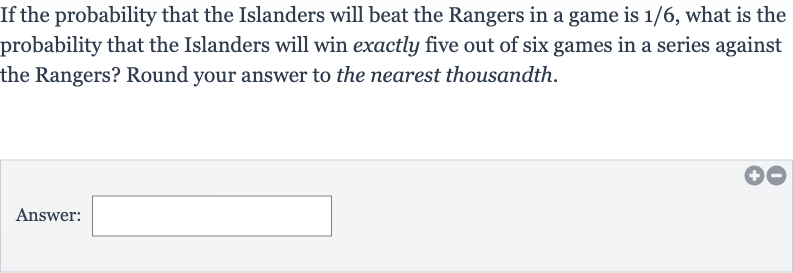AI tutor
Welcome to Bytelearn!
Let’s check out your problem:

If the probability that the Islanders will beat the Rangers in a game is , what is the probability that the Islanders will win exactly five out of six games in a series against the Rangers? Round your answer to the nearest thousandth.Answer:
Full solution
Q. If the probability that the Islanders will beat the Rangers in a game is , what is the probability that the Islanders will win exactly five out of six games in a series against the Rangers? Round your answer to the nearest thousandth.Answer:
- Understand Problem and Formula: Understand the problem and determine the formula to use.We need to calculate the probability of the Islanders winning exactly five out of six games. This is a binomial probability problem, where the number of trials is , the number of successes is , and the probability of success on a single trial is . The formula for the probability of exactly successes in trials is:where is the binomial coefficient, is the probability of success, and is the probability of failure.
- Calculate Binomial Coefficient: Calculate the binomial coefficient for successes in trials.The binomial coefficient ( choose ) is calculated as: choose ) = For our problem, this is: choose ) = = =
- Calculate Probability of Successes: Calculate the probability of exactly successes (wins) and failure (loss).Using the formula from Step , we have:Now we plug in the values from Step :
- Perform Calculations: Perform the calculations.
- Convert Probability to Decimal: Convert the probability to a decimal and round to the nearest thousandth. is approximately equal to when converted to a decimal.Rounded to the nearest thousandth, this is .
More problems from Find probabilities using the binomial distribution
QuestionGet tutor help
QuestionGet tutor help
QuestionGet tutor help
QuestionGet tutor help
QuestionGet tutor help
QuestionGet tutor help
QuestionGet tutor help
QuestionGet tutor help
QuestionGet tutor help
QuestionGet tutor help
